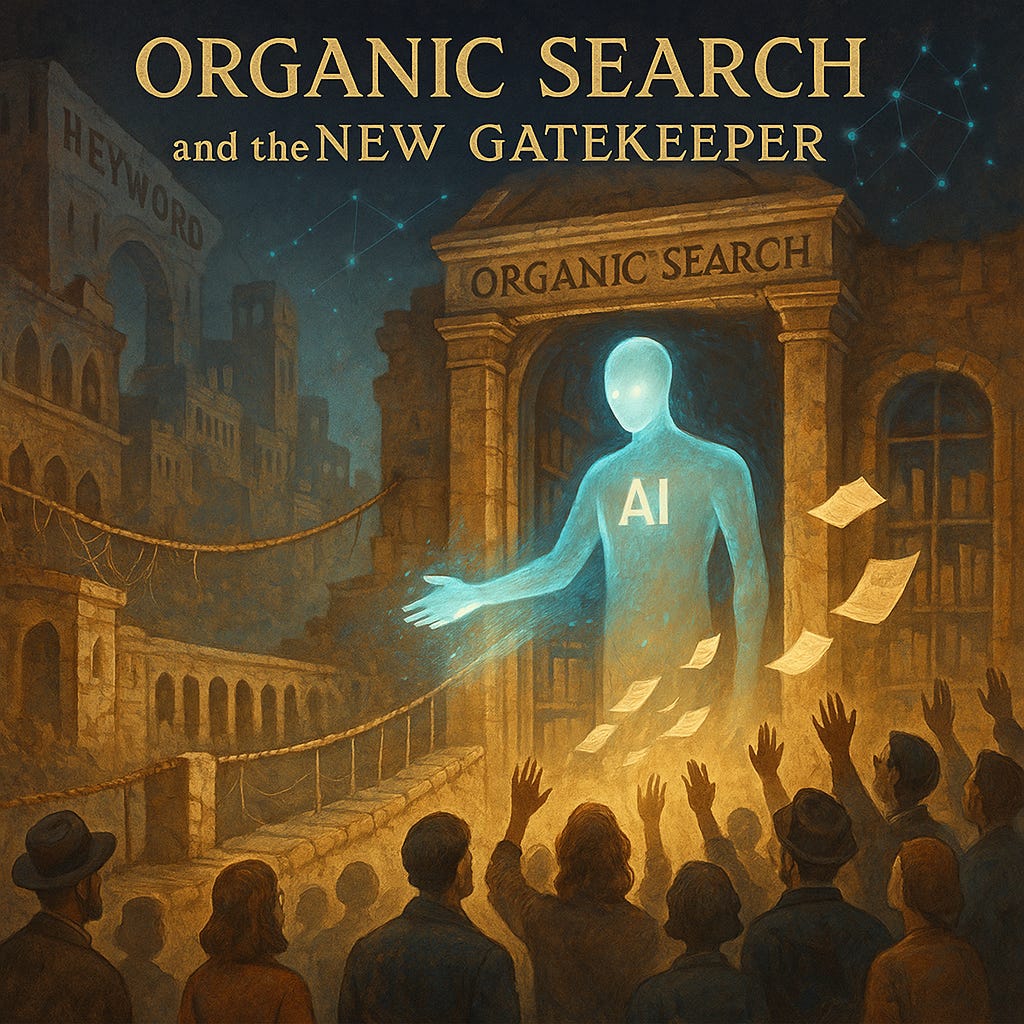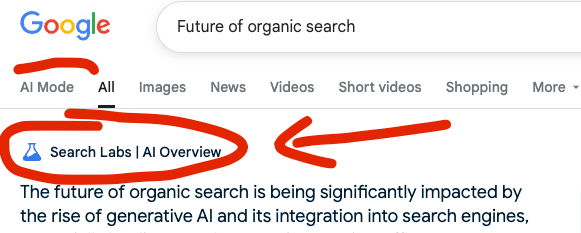How to Be Seen in the AI Search Era
A Survival Guide for Organic Traffic
Hello! Before we dive in, this is a free publication. If you enjoy it, please support it through a subscription, a restack, or a recommendation.
My Medium friends can read this story there as well.
If you’re a writer, creator, or organization that depends on organic search traffic, Google’s AI changes are already reshaping your visibility. In fact, AI search has already been turned on for most users, AI is the new gatekeeper, and initial estimates show traffic out of Google has declined by almost 35%.
The future of search doesn’t look like ten blue links anymore. It looks like AI-generated answers, fewer clicks, and a battle for relevance, where quantity alone won’t get you seen. What will? Clarity, trustworthiness, and deep expertise. AI may summarize content faster, but studies have shown it favors expertise, research, and precision. If you want your work to be found, referenced, or seen by these systems, now’s the moment to start showing up with intention. The opportunity is now.
The Real Shift: Why AI Mode Changes Everything
Search isn’t going away, but it is being rewritten.
In Google’s AI Mode, answers come from dozens of sources, fused into synthesized responses. Sometimes your work is cited. Often, it isn’t. Sometimes users click through. Often, they don’t.
But here’s the shift worth paying attention to: AI doesn’t just pull the largest amount of content. It pulls the most useful, the most clear, the most trusted.
That’s why quality will matter more than ever. Expertise, structure, and semantic clarity are what machines recognize and reuse.
Whether you're building a cause, running a nonprofit, publishing ideas, or shaping culture, this is your window to be positioned for long-term visibility.
Thought leaders will be the ones seen in the new age of web search.
Why This Is Your Positioning Moment
The temptation in fast-moving tech shifts is to wait until things “settle.” But waiting too long has a cost: by the time AI systems have “learned” who the trusted sources are, you’ll either be in that knowledge map or not.
That’s why now is the strategic moment to invest in how your work is seen, structured, and surfaced.
For nonprofits, churches: your on-the-ground insights and original data are gold, if they’re presented in ways AI can retrieve and cite.
For writers and creators: your unique voice and clarity of thought can earn you presence, not just pageviews, if you structure it for retrieval, with quality, showing expertise, not just quantity of shallow content.
This isn’t about gaming the system. It’s about becoming the kind of voice these systems rely on.
So what can we do now to prepare for what we know is the future of search? If your organic traffic is 10%, 25%, or even 50%, you cannot afford to miss the following practical steps…
Practical Steps: How to Future-Proof Your Organic Visibility
If you’re wondering where to start, here are five clear steps you can take right now to strengthen your position, not just for today’s search landscape, but for what’s coming next.
1. Check Your Current Visibility (Especially if You Use Substack)
Before you make changes, understand your baseline. Google Search Console is the best free tool to track how many people find you through Google.
👉 Here’s a guide for Substack creators on how to check your Google search traffic by Kristi Koeter.
If you’re seeing organic traffic, great. That means people are already finding you. Now let’s make sure they keep finding you as AI becomes the default.
2. Prioritize Quality Over Quantity
AI is no longer scanning for keyword repetition, it’s evaluating clarity, credibility, and semantic precision. That means:
Invest in fewer, better posts—structured, sourced, and thoughtful
Write with intentional authority: clear answers, personal insight, and trusted data
Avoid “AI slop.” Be the source others cite, not the summary of other summaries
3. Build Topic Authority, Not Just Keywords
In the AI era, prompts > keywords. Search engines now expand queries into related topics and reasoning paths. To stay in those results:
Create clusters of content around your area of expertise
Use ChatGPT or Gemini to brainstorm related search prompts and subtopics
Write passage-level insights, short, citation-worthy paragraphs that answer specific angles or comparisons
Don’t aim to answer everything. Aim to be the clearest voice on what you know best.
4. Focus on Real-World Credibility
AI and Google both use authority signals to decide what gets cited. Start building those signals now:
Earn backlinks and mentions from reputable publications
Get quoted or shared on platforms like Reddit, LinkedIn, or newsletters
Create original data or insights your audience can’t find anywhere else
This isn’t just SEO, it’s trust-building that pays off in human and machine-powered ecosystems alike.
5. Diversify How People Discover You
You can’t rely on Google alone.
Instead:
Grow an email list
Share your insights on platforms where your audience already is (LinkedIn, YouTube, X, etc.)
Consider creating a free resource, visual guide, or tool that offers unique value
When you diversify your visibility, you build resilience, and that may be your biggest asset in the next wave of search.
Over the next few weeks, I’ll break down each of these five steps in more detail, one post at a time. If you’re serious about future-proofing your visibility in this new era of AI-driven search, now’s a great time to subscribe. These aren’t theoretical steps, they’re practical guides to help your voice, your message, and your mission still be seen.
Position Yourself Now
This isn’t the end of organic traffic, but it is the end of getting found by accident.
The voices and organizations that get cited in AI-generated results tomorrow are the ones who start showing up with clarity and credibility today.
You don’t need to master every new tool. You just need to be intentional. Sharpen your message. Structure your expertise. Show up with quality. Then let the machines, and the people they serve, find you.
TL;DR: If You Only Remember This
Search hasn’t ended, it’s evolved. AI is now the first filter, summarizing content before people even see a page.
Quantity won’t get you cited. Clarity, credibility, and depth will.
Expertise is the new SEO. Structured insights, not surface-level content, shape AI responses.
Your window is now. What you build today teaches AI what to trust tomorrow.
Don’t aim to rank, aim to be the source AI reaches for.
Learning Corner
Lastly, here are some articles I’ve learned from this week coming from three great writers, Rozanna Mostafa, Alex Pawlowski, and Phil Pinelli.
PS: Enjoy this? You can buy me a coffee here and support future free content like this one.
If this helped reframe how you think about being seen in a world of AI search, I’d love for you to subscribe.









This "Be the source others cite, not the summary of other summaries" really resonates!
So true that we don't want to be the one that summarize other summaries, the real value is to become the source that others cannot find elsewhere.
The core takeaway is brutal but accurate: the AI search shift kills passive visibility. If you’ve been coasting on keywords or volume, you’re already invisible. AI’s retrieval layers only surface sources it can trust, which means topical authority and structured clarity aren’t optional anymore.